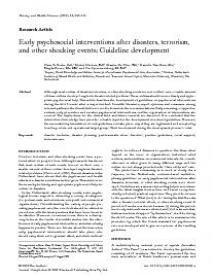Early psychosocial interventions after disasters, terrorism, and other shocking events : Guideline development
Although most victims of disasters, terrorism, or other shocking events recover on their own, a sizable amount of these victims develops long-term disaster-related problems. These victims should receive timely and appro-priate psychosocial help. This article describes the development of guidelines on psychosocial interventions during the first 6 weeks after a major incident. Scientific literature, expert opinions, and consensus among relevant parties in the clinical field were used to formulate the recommendations. Early screening, a supportive context, early preventive and curative psychosocial interventions, and the organization of interventions are covered. The implications for the clinical field and future research are discussed. It is concluded that the international knowledge base provides valuable input for the development of national guidelines. However, the successful implementation of such guidelines can take place only if they are legitimated and accepted by local key actors and operational target groups. Their involvement during the development process is vital.
Geachte bezoeker,
De informatie die u nu opvraagt, kan door psychotraumanet niet aan u worden getoond. Dit kan verschillende redenen hebben,
waarvan (bescherming van het) auteursrecht de meeste voorkomende is. Wanneer het mogelijk is om u door te verwijzen naar de bron
van deze informatie, dan ziet u hier onder een link naar die plek.
Als er geen link staat, kunt u contact opnemen met de bibliotheek,
die u verder op weg kan helpen.
Met vriendelijke groet,
Het psychotraumanet-team.
In: Nursing and Health Sciences, ISSN 14410745 | 11 | 4 | 336-343 | Wiley Online Library [Host]
http://onlinelibrary.wiley.com/doi/10.1111/j.1442-2018.2009.00491.x/abstract;jsessionid=BCC89B1527ECB43D8B2172B94CE8C5C1.f03t04


